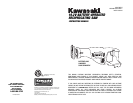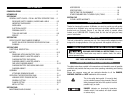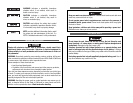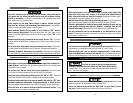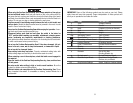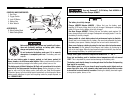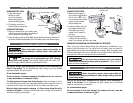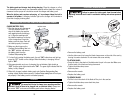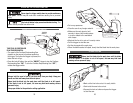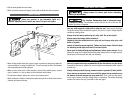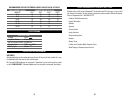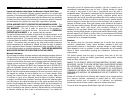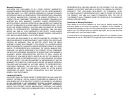
MAINTENANCE AND CLEANING
Always remove the battery pack before attempting
cleaning or maintenance.
This Cordless Reciprocating Saw is lubricated before
it leaves the factory. This lubrication should last for the life of the tool. No
further lubrication is required.
Use only mild soap and a damp cloth to clean the tool. Never let any liquid get
inside the casing. Never immerse any part of the tool in a liquid. Always keep the
ventilation openings clear.
Always clean the battery pack using only a dry cloth. Do not use liquids.
Always unplug the charger before cleaning it.
Regularly clean the ventilation slots in your tool and charger using only a soft
brush or dry cloth.
Inspect all mounting screws regularly. Tighten any loose screws. Failure to keep
the mounting screws tight could result in serious injuries.
Never open the Cordless Reciprocating Saw case, battery pack or charger.Do not
attempt to repair the Cordless Reciprocating Saw, battery pack or charger yourself.
Opening any of these parts will void your warranty.
ACCESSORIES
Use only accessories that are recommended by the manufacturer for your model.
Accessories that may be suitable for one tool may become hazardous when used on
another tool.
Always attach grounded (3-prong) extension cords to grounded (3-hole) outlets.
If you must use an extension cord, be sure that the gauge is large enough to carry
the amount of current necessary for your power tool. If not, your tool may experi-
ence a loss of power, excessive voltage drop or overheating. The smaller the gauge
number, the heavier the cord (see table on the next page).
18
• Set the shoe against the work piece.
• When the blade reaches full speed, slowly feed the blade into the work piece.
METAL CUTTING
Never use gasoline or any flammable liquid as a
lubricant. Sparking from the motor may cause it to ignite into flames.
• When cutting metals other then copper, brass or aluminum, always use a lubricant,
such as cutting oil, to keep the blade cool. This will prolong the life of the blade as
well as speeding up the cutting process.
• Make sure the work piece is held securely in place. Hold smaller pieces, such as
pipe or conduit, in a vise or attach to the workbench with clamps.
• To eliminate vibration, always cut close to the clamping point.
• When cutting thin sheets of metal, place a piece of plywood on either side to control
vibration and prevent tearing.
17
OIL



